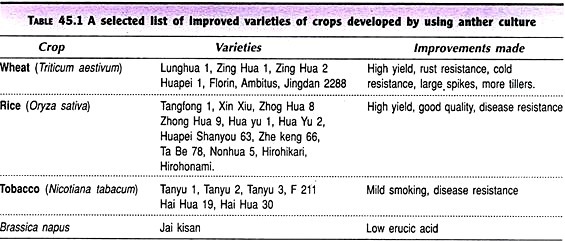Read this article to learn about the various applications of haploid plants.
In vitro production of haploids is of great significance in plant breeding programmes. Some of them are listed below:
1. Development of homozygous lines:
It is now possible to develop homozygous lines within a span of few months or a year by employing anther/pollen culture. This is in contrast to the conventional plant breeding programme that might take several years (6-10 yrs). In this way, production of haploids is highly useful for research related to plant genetics and breeding.
2. Generation of exclusive male plants:
By the process of androgenesis to produce haploids, followed by chromosome doubling, it is possible to develop exclusive male plants. The male plants are particularly useful when their productivity and applications are much more than female plants.
3. Induction of mutations:
In general, majority of induced mutations are recessive and therefore are not expressed in diploid cells (due to the presence of dominant allele). Haploids provide a convenient system for the induction of mutations and selection of mutants with desired traits. In fact, the haploid cells can be cultured and handled in a fashion similar to microorganisms.
Mutants from several plant species that are resistant to antibiotics, toxins, herbicides etc. have been developed. When the haploid cells of tobacco plant (Nicotiana tabacum) were exposed to methionine sulfoximine (a mutagen), mutants which showed lower level of infection to Pseudomonas tabaci were produced.
4. Production of disease resistance plants:
Disease resistance genes can be introduced while producing haploids. The so developed haploids are screened for the desired resistance, and then diploidized.
Some examples of disease resistance plants are listed:
1. Hwansambye, a rice variety resistant to leaf blast, bacterial leaf blight and rice stripe tenui virus.
2. Barley accession Q21681 resistant to stem rust, leaf rust and powdery mildew.
More examples of disease resistance crops are given in Table 45.1.
5. Production of insect resistance plants:
Some varieties of rice resistant to insects have been developed e.g. Hwacheongbyeo resistant to brown plant hopper. Other varieties of rice that are resistant to pests have also been produced.
6. Production of salt tolerance plants:
The plant species with salt tolerance are needed for their cultivation in some areas. Anther cultures have resulted in some varieties of rice and wheat with good salt tolerance e.g. wheat Hua Bain 124-4.
7. Cytogenetic research:
Haploids are useful in several areas of cytogenetic research. These include
i. Production of aneuploids
ii. Determination of the nature of ploidy
iii. Determination of basic chromosome number
iv. Evaluation of origin of chromosomes.
8. Induction of genetic variability:
Besides the development of haploid mutants, it is also possible to produce plants with various ploidy levels through androgenesis.
9. Doubled haploids in genome mapping:
Genome mapping, a recent development in molecular biology, can be more conveniently achieved by using doubled haploid plant species.
10. Evolutionary studies:
A comparison of di-haploids (doubled haploids) with diploid wild plant species will be useful to trace the evolutionary origin of various plants. The close evolutionary relationship between tomato and potato has been evaluated by this approach.
Crops Developed Through Anther Cultures:
Anther culture has made it possible to develop many new varieties of plants; a selected list is given in Table 45.1. In general, the new crops are high-yielding varieties with disease resistance. Some of them are resistance to cold, salt etc. Many plant breeders these days use anther cultures in their regular breeding programmes.
